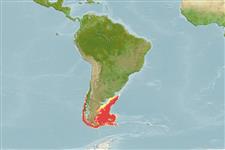Elasmobranchii (sharks and rays) >
Rajiformes (Skates and rays) >
Rajidae (Skates)
Etymology: Amblyraja: Greek, amblys = darkness + Latin, raja, -ae = ray (Raja sp.) (Ref. 45335).
Eponymy: Professor Martin Doello-Jurado (1884–1948) was a marine biologist and malacologist, who was also interested in palaeontology. [...] (Ref. 128868), visit book page.
Environment: milieu / climate zone / depth range / distribution range
Ecology
Marine; demersal; depth range 50 - 640 m (Ref. 114953). Subtropical; 35°S - 57°S, 78°W - 53°W (Ref. 114953)
Southeast Pacific: Chile (Ref. 27540, Ref. 114953). Southwest Atlantic: off Argentina (Ref. 26282) and Uruguay, including Falkland Islands (Ref. 58839, Ref. 114953).
Size / Weight / Age
Maturity: Lm ? range ? - ? cm
Max length : 69.0 cm TL male/unsexed; (Ref. 114953)
Found on mid- and outer continental shelf and upper slope, occasionally caught deeper to 1000 m. Mainly feeds on benthic invertebrates and small bony fishes (Ref. 114953). Oviparous. Distinct pairing with embrace. Young may tend to follow large objects, such as their mother (Ref. 205). Eggs are oblong capsules with stiff pointed horns at the corners deposited in sandy or muddy flats (Ref. 205). Egg capsule measures 86.4 mm long and 56.2 mm wide (Ref. 41249). Hatches from egg case at ca. 9 cm TL (Ref. 114953).
Life cycle and mating behavior
Maturity | Reproduction | Spawning | Eggs | Fecundity | Larvae
Oviparous. Distinct pairing with embrace. Young may tend to follow large objects, such as their mother (Ref. 205). Paired eggs are laid. Embryos feed solely on yolk (Ref. 50449).
McEachran, J.D. and K.A. Dunn, 1998. Phylogenetic analysis of skates, a morphologically conservative clade of elasmobranchs (Chondrichthyes: Rajidae). Copeia 1998(2):271-290. (Ref. 27314)
IUCN Red List Status (Ref. 130435: Version 2024-1)
Threat to humans
Harmless
Human uses
Tools
Special reports
Download XML
Internet sources
Estimates based on models
Preferred temperature (Ref.
123201): 4.5 - 9, mean 7.3 °C (based on 65 cells).
Phylogenetic diversity index (Ref.
82804): PD
50 = 0.5010 [Uniqueness, from 0.5 = low to 2.0 = high].
Bayesian length-weight: a=0.00302 (0.00141 - 0.00645), b=3.24 (3.07 - 3.41), in cm total length, based on LWR estimates for this (Sub)family-body shape (Ref.
93245).
Trophic level (Ref.
69278): 4.1 ±0.2 se; based on size and trophs of closest relatives
Resilience (Ref.
120179): Low, minimum population doubling time 4.5 - 14 years (Fec assumed to be <100).
Fishing Vulnerability (Ref.
59153): Moderate to high vulnerability (48 of 100).
